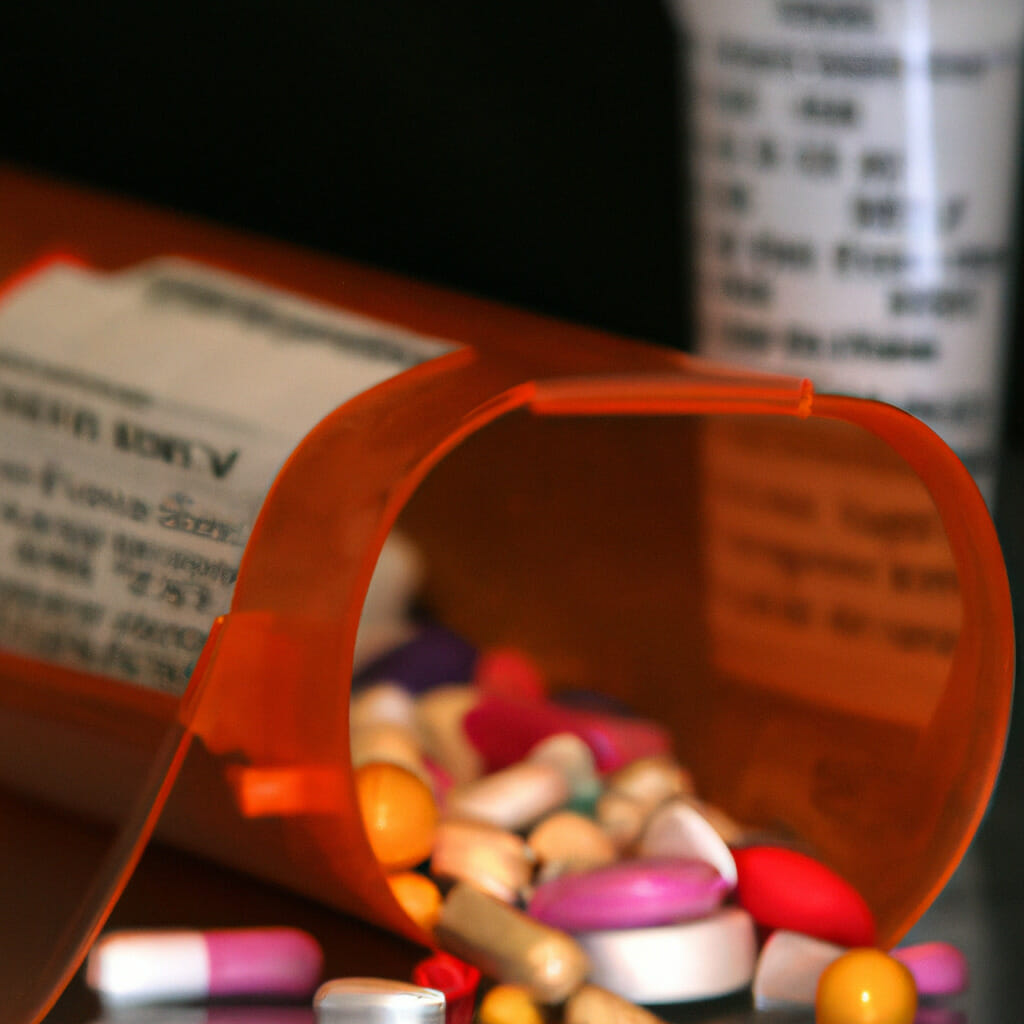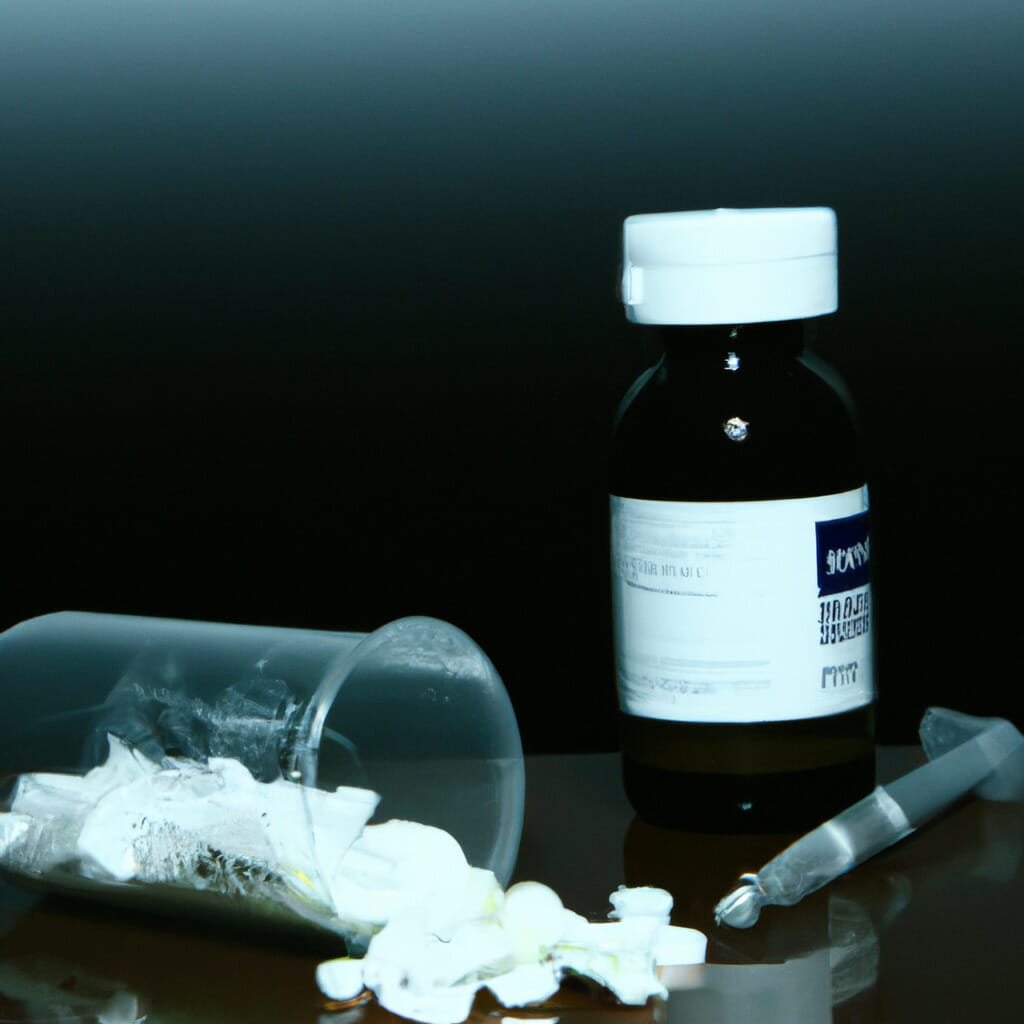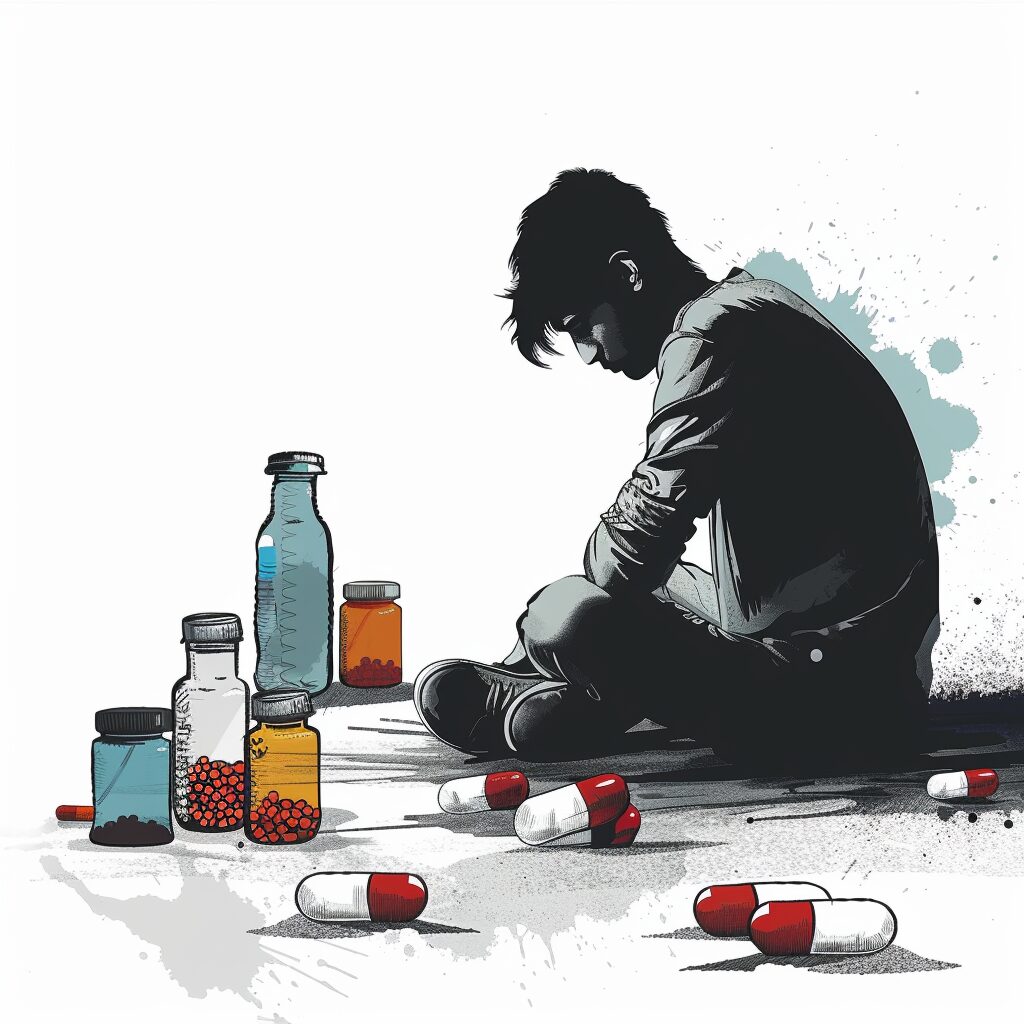Key Takeaway:
- Medication can help treat depression and addiction: While other approaches such as therapy and lifestyle changes can be effective in treating depression and addiction, medication can also play an important role in managing symptoms and supporting recovery.
- Antidepressants can be beneficial for treating depression: There are different types of antidepressants that work in different ways, and they can be effective in reducing symptoms of depression such as sadness, anxiety, and sleep disturbances. However, it is important to be aware of potential side effects and to work closely with a healthcare provider when taking antidepressants.
- Medications for addiction can assist in recovery: Medications can be used to reduce cravings and withdrawal symptoms, and to prevent relapse in individuals with substance use disorders. It is important to work with a healthcare provider to determine the most appropriate medication and dosage for each individual, and to monitor for potential side effects and interactions with other medications.
Are you struggling to overcome depression and addiction? Medication could be the answer you are looking for, as it has been proven to be beneficial in treating both. In this article, we’ll explore how medication can help improve mental health.
Understanding Depression and Addiction
Depression and addiction are two complex issues that are closely linked to each other. Understanding the relationship between the two can help in developing effective treatment plans that address both mental health disorders. Depression is a serious medical condition, which is characterized by persistent sadness, hopelessness, and lack of interest in activities that were once enjoyable. Addiction, on the other hand, is a chronic disease that involves compulsive drug seeking and use despite negative consequences.
Understanding depression and addiction requires an understanding of how these conditions work. Depression affects the brain’s chemical messengers known as neurotransmitters, leading to imbalances in mood-regulating chemicals such as serotonin, norepinephrine, and dopamine. Individuals may turn to drugs or alcohol as a way of self-medicating their symptoms of depression. However, this often leads to addiction due to the effects of substance abuse on the brain’s reward system.
It is essential to note that not all individuals with depression will develop an addiction or vice versa. It depends on various factors such as genetics, environment, and personal experiences. Furthermore, depression and addiction can be co-occurring conditions or independent of each other.
While treating depression and addiction separately has shown some success, it may not be enough for individuals with co-occurring conditions. According to research studies conducted over time by medical professionals globally co-existing disorders like depression and addiction require integrated treatment plans for holistic recovery.
A prime example of intense mind-body turmoil leading to substance abuse lies within American singer-songwriter Demi Lovato’s struggles with both conditions throughout her life.
Now that we have gained insight into how depression & addiction work let us delve into ways medication can help treat bad mental health days caused due to anxiety or stressful everyday situations….
Ways Medication Can Help
Ways Medication Can Help – Medication is a potent aspect of therapeutic interventions that are effective in treating mental conditions like depression and addiction. It is a tool that can significantly contribute to improving the quality of life of individuals, leading to a productive livelihood that might have been affected by the mental disorder. The ability of medication to ease symptoms, boost mood, lower anxiety levels and aid good sleep is why it works.
Antidepressants are a type of medication that plays a crucial role in fighting depression, one of the most common mental disorders. These medications work by increasing the amount of neurotransmitters such as serotonin and norepinephrine, which regulate mood and emotions in the brain. When these neurotransmitters’ balance improves, it creates positive impressions on an individual’s state of mind, making them feel better overall.
One significant advantage that medication possesses over psychotherapy or cognitive-behavioral therapy (CBT) is the former’s quick results in easing symptoms. Typically, within several weeks after starting treatment, patients begin to feel better about themselves and their lives’ general outlook.
Interestingly, research studies prove how medication helps curb addiction habits among addicts seeking recovery. Treating addiction with medication can help overcome withdrawal symptoms and manage cravings effectively. For instance, methadone is an opioid used effectively to treat heroin addiction while buprenorphine aids people battling similar addictions process negative effects associated with chronic use.
A fact stated in The New England Journal of Medicine provides compelling evidence supporting medication for drug abuse disorders as it found out Medication-Assisted Treatment supported recovery outcomes higher than behavioral therapy alone.
“Medication indeed played an integral part in my battle with depression; However,” Depression has its unique way of affecting individuals differently.”
Medication for Depression
As someone who has struggled with depression, I know firsthand the importance of finding effective treatment. For many people, medication can be a vital tool in managing symptoms and improving overall well-being. In this part of our discussion on the role of medication in treating depression and addiction, we’ll take a closer look at medication for depression.
We’ll examine the different types of antidepressants that are commonly prescribed, and the benefits that they can provide for those struggling with depression. We’ll also discuss some of the potential side effects that can occur, and how to manage them.

Image credits: www.lantanarecovery.com by Hillary Washington
Different Types of Antidepressants
Different types of antidepressants play a vital role in treating depression and addiction. There are four main categories of antidepressant medications – selective serotonin reuptake inhibitors (SSRIs), serotonin-norepinephrine reuptake inhibitors (SNRIs), tricyclic antidepressants (TCAs), and monoamine oxidase inhibitors (MAOIs).
SSRIs are the most commonly prescribed type of antidepressants. They work by increasing the levels of the neurotransmitter called serotonin in the brain, which helps regulate mood. Examples include Prozac, Zoloft, and Lexapro.
SNRIs are similar to SSRIs but also increase the levels of another neurotransmitter called norepinephrine. Examples include Cymbalta, Effexor, and Pristiq.
TCAs have been around for several decades and work by increasing the levels of both serotonin and norepinephrine. However, they can have more side effects than other types of antidepressants. Examples include Elavil, Pamelor, and Tofranil.
MAOIs are less commonly used due to their potential to interact negatively with certain foods and other medications. They work by preventing an enzyme called monoamine oxidase from breaking down certain neurotransmitters that regulate mood. Examples include Nardil, Parnate, and Marplan.
It’s important to note that not all antidepressants work for every individual with depression or addiction. The decision to prescribe one type of medication over another is based on various factors such as medical history, co-occurring conditions, potential side effects, and personal preference.
As someone who has struggled with depression myself, I highly recommend seeking professional help if you’re experiencing symptoms. Additionally, taking medication alone may not be enough to fully address depression or addiction – therapy and lifestyle changes can also be crucial components in treatment.
Next up: Wondering how exactly these different types of antidepressants can help with depression? Let’s dive into the benefits.
Benefits of Antidepressants for Depression
Antidepressants are a highly recommended medication for people experiencing depression. They work by altering the balance of chemicals in the brain that regulate mood and emotions.
Here are some key benefits of antidepressants:
- Firstly, antidepressants can significantly reduce feelings of hopelessness, anxiety and sadness, making daily functioning more manageable.
- Secondly, they help stabilize emotions and prevent intense mood swings that often come with depression.
- Thirdly, antidepressants can improve appetite, sleep quality and energy levels – all areas which are typically impacted when someone is going through a depressive episode.
Furthermore, studies have shown that antidepressants can lead to long-term improvements in mental health. This is because people who take medication for depression are able to work through their issues in therapy or counseling more effectively since they have regained some level of emotional stability.
Additionally, it’s important to note that everyone’s experience with antidepressants is different. Some people may find them extremely helpful while others may not experience any change at all. It’s also worth mentioning that dosage and type of antidepressant matter – finding the correct match requires the help of a licensed physician or psychiatrist.
One example of someone who greatly benefited from taking antidepressants is author Matt Haig. In his memoir titled “Reasons to Stay Alive”, he shares how medication helped him manage his depression after suffering from suicidal thoughts for years. Haig explains that it ultimately allowed him to better process his emotions and appreciate life more deeply.
As I move onto the next section about possible side effects of antidepressants, remember this: although there are certainly downsides to taking medication for depression (as with any medication), the benefits just might outweigh the costs for some individuals!
Possible Side Effects of Antidepressants
Possible side effects of antidepressants can be slightly different for each individual, but there are some common ones that are worth mentioning. These can include nausea, fatigue, weight gain, insomnia or drowsiness, changes in appetite or sex drive, and dry mouth. It is essential to note that most side effects only last a few weeks but should be reported to the healthcare provider if they persist.
One of the main things that people worry about is the possibility of developing suicidal thoughts when taking antidepressants. However, studies have shown that medication reduces suicide risk overall. Additionally, some studies suggest that certain individuals may actually have an increase in suicidal ideation when taking an antidepressant. Therefore it’s crucial to discuss concerns with a healthcare provider before starting treatment.
Another potential side effect is serotonin syndrome a rare but severe complication where too much serotonin builds up in the body. Symptoms may include hallucinations, confusion, rapid heartbeat and high blood pressure. Patients experiencing these symptoms should seek urgent medical attention.
Once, a man complained of having vivid dreams every night after taking his antidepressant pills before bed. His doctor advised he switch his medication schedule to mornings instead to help lessen this particular side effect. After making the switch as recommended by his doctor has noted a significant difference and saw improvement regarding his sleep quality and was able to work as well.
Hey reader! Are you ready for another round? Next up- Medication for Addiction: The Butterfly Effect!
Medication for Addiction
As a mental health practitioner, I ve seen how medications can play a crucial role in treating addiction. In this part of the article, we ll discuss the different types of medications that are used to treat addiction, how medications can assist with addiction, and the possible side effects of addiction medications. It s important to know that medication-assisted treatment (MAT) has been proven to reduce the risk of relapse and increase the chances of recovery. So, let’s dive right in and explore the role of medication in treating addiction.

Image credits: www.lantanarecovery.com by Adam Jones
Types of Medications Used to Treat Addiction
When it comes to treating addiction, medications are a powerful tool that can be used in conjunction with therapy and other forms of treatment. There are several types of medications used to treat addiction, each with its own unique benefits and potential side effects.
The first type of medication used to treat addiction is called an antagonist. These medications work by blocking the effects of certain drugs or alcohol, making them less appealing or even unpleasant for the user. Examples of antagonists include naltrexone for opioid addiction and disulfiram for alcoholism.
Another type of medication used for addiction is agonist therapy. These drugs work by mimicking the effects of addictive substances in a controlled and regulated manner, which can help reduce cravings and withdrawal symptoms. Methadone is a common agonist therapy drug used in the treatment of opioid addiction.
Partial agonists are another type of medication that can be effective in treating addiction. These drugs are similar to agonists but do not produce as strong of an effect, making them safer and less likely to cause dependence or overdose. Buprenorphine is an example of a partial agonist often used in opioid addiction treatment.
Finally, there are medications that address co-occurring mental health disorders, such as depression or anxiety, that may contribute to addictive behaviors. These types of medications can help stabilize mood, reduce symptoms such as insomnia or panic attacks, and ultimately make it easier for individuals to engage in lifestyle changes conducive to recovery.
Pro Tip: It’s important to note that while medications can be extremely helpful in treating addiction, they should always be used under the supervision of a qualified medical professional who specializes in addiction medicine.
Next up: Emphasizing Medications’ Role in Addiction Treatment
How Medications Can Assist with Addiction
Medications can assist with addiction by mitigating withdrawal symptoms and reducing the craving for drugs. Addiction is a complicated disease wherein an individual becomes dependent on certain substances causing significant emotional, physical, and social consequences. Medication-assisted treatment (MAT) involves using prescription medications to treat drug or alcohol addiction along with counseling and behavioral therapies.
The medications used in MAT have different mechanisms of action; some work by blocking the effects of exogenous opioids, while others reduce the effects of withdrawal symptoms. For example, Methadone and Buprenorphine are opioid agonists that bind to receptors in the brain, thereby reducing cravings for other opioids such as heroin or morphine. Naltrexone is another medication that blocks opioid receptor sites so that even if a person uses opioids, it does not produce euphoria or any other pleasurable effect.
Furthermore, these medications can help individuals attain stability throughout their recovery process by reducing relapse rates and preventing overdose fatalities. They also improve social functioning, reduce criminal activity and transmission of infectious diseases associated with injection drug use.
Moreover, MAT has proven effective not only in treating people addicted to prescription painkillers but also in helping those addicted to alcohol or other substances like cocaine and methamphetamine.
Pro Tip: Always consult a doctor before starting any medication for addiction treatment. Certain medications can pose risks when combined with other substances or underlying medical conditions.
Want to know about the possible side effects of addiction medications? Beware – relief from substance abuse comes at a price!
Possible Side Effects of Addiction Medications
Possible Side Effects of Addiction Medications can range from mild to severe and may vary depending on the medication prescribed. Some common side effects include nausea, vomiting, dizziness, headache, and constipation. It is important to discuss any symptoms or concerns with your healthcare provider.
Other possible side effects of addiction medications include mood changes, sleep disturbances, and sexual dysfunction. Certain medications may also increase the risk of suicidal thoughts or behaviors. It is crucial to inform your doctor if you have a history of mental health issues or are currently taking any other medications.
Research has shown that some medications for addiction may also have long-term risks such as liver damage or heart problems. These risks should be considered in the context of the potential benefits of medication-assisted treatment for addiction.
I remember when I started taking addiction medication and faced significant challenges with side effects. My sleep cycle began to shift rapidly, leading to insomnia that made me feel tired throughout the day at work. I also noticed my appetite changing where I would find myself craving sugary foods more often than usual which added weight that made me even more susceptible to feeling sluggish.
As I was trying to adjust myself back into my daily routine with work as well as other activities that were previously challenging due to my addiction, these complications negatively impacted my productivity along with physical and emotional health. Nevertheless, after discussing these issues with my healthcare provider and getting their recommendation on how best to handle this situation, things gradually became better.
Given the seriousness of Possible Side Effects of Addiction Medications, it is essential for those undergoing medication-assisted therapy to pay attention to their body’s response and seek help immediately when they notice something unusual happening. In our next section ‘Medication Interactions’ we will explore how different types of medication interact with each other during this process so stay tuned!
Medication Interactions
When it comes to treating depression and addiction, medication can play a crucial role. However, it’s important to understand that combining medications can lead to interactions that can impact their effectiveness and potentially cause harm. In this part, we’ll take a closer look at medication interactions and the potential risks of combining medications to treat depression and addiction. We’ll explore how different medications can interact and the ways that doctors work to minimize these risks.

How Different Medications Can Interact
Different medications can interact in various ways, causing unexpected side effects or reducing the effectiveness of the individual medicines. It is important to be aware of these interactions and take precautions to minimize their potential impact.
To illustrate how different medications can interact, we have created a HTML table with four columns. The first column lists common types of medication, including antidepressants, opioids, benzodiazepines, and blood thinners. The second column lists potential drug interactions that may occur if these medications are combined with other drugs or substances. The third column describes possible side effects that may result from these interactions. Finally, the fourth column provides guidelines for minimizing these risks.
In addition to avoiding specific combinations of medications that are known to cause harm or reduce effectiveness, there are other steps you can take to minimize the risk of drug interactions. First, make sure that all healthcare providers are aware of every medication you are taking, including over-the-counter drugs and supplements. Second, read labels carefully and follow dosing instructions precisely. Thirdly, the role of interpersonal therapy can be effective in treating depression and addiction. Lastly, avoid drinking alcohol while taking medications as it can increase the risk of dangerous interactions.
Before combining any new medications or supplements with your existing treatment plan for depression or addiction, it’s essential to discuss them with your healthcare provider fully. They will be able to assess any risks associated with the proposed medication combination and provide you with guidance on how best to proceed.
With a proper understanding of how different medications can interact and following some practical tips to minimize those risks, you can continue living a healthier life without feeling thwarted by these issues.
Next up – “Risks Involved in Combining Medications: What You Must Know” – because hey! prevention is better than cure – especially when pre-existing conditions meet polypharmacy!
Possible Risks of Combining Medications
Possible Risks of Combining Medications can lead to adverse drug reactions, which can be harmful, and in some cases, deadly. A possible risk that might arise is when two different medicines, taken individually with no problems, may interact adversely in the body if combined.
Possible Risks of Combining Medications involve many different types of interactions that could occur between drugs. Here are five types of medication interactions:
- Drug-Drug interaction
- Drug-Food interactions
- Drug-Nutrient interactions
- Drug-Lifestyle interactions
- Drug-Diseases Interaction.
According to a 2019 national survey on drug use by SAMHSA, over 18 million adults misused prescription medications within twelve months preceding the survey. It shows a significant increase compared to previous years. Combining prescription medication with alcohol or other illegal substances can increase the likelihood of severe adverse effects like seizures, respiratory depression and liver damage.
A history dating back to the 1990s saw large numbers of patients developing a life-threatening heart condition called torsades de pointes after taking an antibiotic called erythromycin alongside other medicines such as cisapride or astemizole. The patients were mostly older people and those with pre-existing conditions that put them at higher risk for cardiac arrhythmias.
“Amidst all the dangers posed by combining medications one needs to be careful as medication affects every individual differently,” concluded my doctor.
Summary of Medication’s Role in Treating Depression and Addiction
Medication plays a crucial role in treating depression and addiction. It is known to work by altering the chemicals in the brain responsible for mood, behavior, and pleasure. The idea behind using medication is that it can help rebalance these chemicals to restore normal brain function.
The use of medication for depression and addiction treatment is often a part of a broader treatment plan that involves therapy, support groups, and lifestyle changes. Medication serves as an additional tool to aid in achieving recovery goals. It can help alleviate symptoms such as anxiety, low mood, and cravings while allowing individuals the ability to engage in other aspects of their recovery journey.
Medication’s role in treating depression and addiction varies based on the type of mental illness or substance use disorder present. Some medications are targeted specifically at addressing symptoms related to depression, while others focus on reducing cravings associated with addictive substances. However, research has shown that medication becomes more effective when used alongside behavioral therapies such as cognitive-behavioral therapy or motivational interviewing.
It has also been noted that not all individuals benefit from medication treatment for depression or addiction equally. While some may experience more significant symptom relief or fewer withdrawal symptoms with proper medication use, others may find little-to-no improvement. Individual differences in biology, genetics, environment, and personal preferences can influence the efficacy of medication.
According to studies by the National Institute on Drug Abuse (NIDA), it has been found that addiction medications are underutilized despite their effectiveness. Many individuals who could benefit from these medications do not receive them due to factors such as lack of awareness among medical professionals or stigma surrounding medication-assisted treatment (MAT) for substance abuse disorders.
All in all, while medication alone may not be sufficient in treating depression or addiction entirely; it remains an essential aspect of comprehensive care plans aimed at supporting long-term recovery goals. Medications have different mechanisms of action depending on the specific condition they aim to treat; their effectiveness depends on the patient’s individual situation.
Recommendations for Future Research on Medication-based Treatment Approaches.
Medication-based treatment approaches have become increasingly popular in treating mental health issues such as depression and addiction. However, there is still much to understand about how these medications work and their long-term effects. Therefore, recommendations for future research on medication-based treatment approaches are necessary.
In order to fully understand the mechanisms behind medication-based treatments, it is important for researchers to continue investigating the specific brain processes that are impacted by different medications. By doing so, they can better identify which medications may be most effective for certain individuals and conditions.
Additionally, researchers should explore potential long-term side effects of these medications as well as possible alternative treatments that may exist. This will allow clinicians to make more informed decisions when prescribing medication-based treatments to patients.
It is also important for researchers to examine the impact of individual differences in physiology and genetic makeup on the efficacy of these treatments. As we continue to gain a deeper understanding of how medications work within unique bodies, we can better tailor treatment plans to each patient s specific needs.
To fully implement these recommendations for future research, funding and support from both governmental agencies and private institutions will be crucial. Investing in this type of research has the potential to revolutionize mental health treatment options and improve outcomes for millions of people struggling with depression and addiction.
By staying informed about ongoing research efforts and advocating for continued funding toward medication-based treatment approach studies, individuals can play a role in ensuring that promising new findings are discovered quickly – potentially benefiting themselves or loved ones dealing with mental health struggles.
Five Facts About The Role of Medication in Treating Depression and Addiction:
- Medication can be a helpful tool for managing symptoms of depression and addiction, but it should not be the only treatment used. (Source: National Institute on Drug Abuse)
- Antidepressant medications are commonly prescribed to treat depression, but they can take several weeks to start working. (Source: Mayo Clinic)
- Medication-assisted treatment (MAT) is an effective approach to treating substance use disorders, combining medications with counseling and other psychosocial therapies. (Source: Substance Abuse and Mental Health Services Administration)
- Like any medication, antidepressants and addiction treatment medications can have potential side effects and risks, and should only be taken under the supervision of a healthcare provider. (Source: American Psychiatric Association)
- It is important for individuals to work with a healthcare provider to determine the most appropriate treatment plan for their unique needs and circumstances. (Source: National Alliance on Mental Illness)
FAQs about The Role Of Medication In Treating Depression And Addiction
What is the role of medication in treating depression and addiction?
The role of medication in treating depression and addiction can help both people who are depressed and people who are addicted to drugs. Antidepressants can help control your mood and ease the symptoms of depression, while medications for addiction can help you deal with cravings and withdrawal symptoms. But to get the best results, medication should be used along with therapy and other forms of treatment.
What types of medication are used to treat depression?
There are several types of medication that may be used to treat depression, including selective serotonin reuptake inhibitors (SSRIs), serotonin and norepinephrine reuptake inhibitors (SNRIs), tricyclic antidepressants (TCAs), and monoamine oxidase inhibitors (MAOIs). Your healthcare provider will determine the best medication for your individual needs.
Are there any side effects of medication for depression?
Yes, there can be various side effects of medication for depression, including but not limited to nausea, dizziness, weight gain, sexual dysfunction, and insomnia.
What types of medication are used to treat addiction?
The types of medication that used to treat addiction are a common way to treat addiction, and they often involve using drugs to control cravings and withdrawal symptoms. Methadone, buprenorphine, and naltrexone are some of the medications used in MAT for opioid addiction. Acamprosate and disulfiram are used for alcohol addiction.
Can medication alone treat depression and addiction?
While medication can be an effective treatment for depression and addiction, it is often most effective when used in conjunction with therapy and other forms of treatment, and is not typically recommended as the sole treatment approach.
Are there any risks associated with taking medication for depression and addiction?
Yes, there can be risks associated with taking medication for depression and addiction, such as potential interactions with other medications, increased risk of overdose, and the potential for dependence or addiction to the medication itself.










